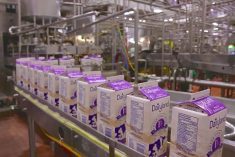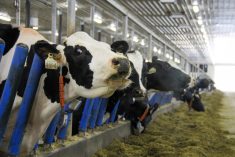Updated, May 11, 2016 — Canadian dairy processing co-operative Agropur says a three-month national program to subsidize use of Canadian dairy ingredients will allow it to “immediately” end its own imports of diafiltered milk.
“We had pledged to stop importing diafiltered milk as soon as conditions allowed,” co-op president Serge Riendeau said Tuesday in a release. “Today, as a result of this program, we are in a position to do so.”
Agropur said a “stop-gap” interim national program set up by the Canadian Milk Supply Management Committee (CMSMC) “supports access to Canadian ingredients at competitive prices” effective May 1 to July 31.
Read Also

General Mills keeps annual outlook as North America demand softens
General Mills maintained its annual sales and profit forecasts on Wednesday, as the Cheerios maker grapples with rising economic uncertainty and softer demand in key markets, including North America.
“While the interim national program is temporary, its creation is good news since it makes it possible for us to stop using imported diafiltered milk while remaining competitive and supporting our members and all Canadian milk producers,” Riendeau said.
Agropur becomes the “first major national processor” in Canada to halt its use of diafiltered milk, the co-op said. Quebec media have previously quoted other dairy firms in the province as saying they don’t use the imported ingredient.
Dairy Farmers of Canada said Wednesday it salutes Agropur’s decision on imported diafiltered milk. “This commitment to protecting the dairy industry is well-received by dairy farmers across the country. We encourage other Canadian dairy processors to follow suit.”
According to the Canadian Dairy Commission, which chairs the CMSMC, the committee in April modified the prices paid in milk class 4(m) for milk protein concentrates (MPC) for the period from May 1 to July 31.
The committee’s decision, the CDC said, effectively adds liquid MPC and liquid skim milk as ingredients and cheese as a finished product, along with nutraceuticals and pet food.
Class 4(m) was set up to encourage the use of solids non fat (SNF) in specific processing activities, with the goal being to maintain or build up markets for SNF.
The class is now available to makers of “standardized” cheese as well as cottage cheese, feta, cheese curds and paneer, as well as pet food and nutraceuticals.
The CDC said the change was put in place to level the playing field among Canadian cheese makers after Dairy Farmers of Ontario implemented a new class 6 in that province. DFO’s new class, the commission said, gave a “competitive advantage” to Ontario cheesemakers compared to those in other provinces.
Diafiltration is an additional step in milk processing, used sometimes to reach a higher protein concentration.
Riendeau and Agropur have previously criticized a loophole in Canadian import rules that allows diafiltered milk to enter the country as a “protein substance” ingredient while still considered “milk” by the Canadian Food Inspection Agency for the purposes of Canadian processing.
Several processors, according to DFC, today use such imports as part of their required minimum percentage of “milk” when making cheese, rather than in their allowable percentage of added ingredients.
At the border, DFC said, such ingredients are “not even being considered” under the dairy chapter of the Customs Tariff Schedule and thus may enter the country tariff-free.
The ingredient, Riendeau said in a joint statement with other dairy firms and dairy farmer groups last month, was “created to circumvent import rules and Canada’s cheese compositional standards” and is not used to produce cheese in the U.S.
“The government must acknowledge that producers and the majority of processors demand that it take action and apply its own rules,” he said.
DFC has estimated the imports of diafiltered milk and other such ingredients are causing revenue losses estimated at $231 million a year for dairy farmers in Canada.
The issue of diafiltered milk, DFC said Wednesday, “continues to have a huge negative impact on Canada’s dairy farmers. Only an urgent resolution will allow farmers in the fields to concentrate on their work, and stop worrying about their futures.”
With the interim program in place, Agropur said Tuesday, the federal government still must act quickly to enforce Canadian cheese standards, as it pledged in last fall’s federal election campaign.
“It is only fair that if something is considered to be an ingredient when it crosses the border, it is also considered to be an ingredient when it is used to make cheese,” DFC chairman Wally Smith said in a separate statement last week.
“As well, a national ingredients strategy including all provinces must be agreed on as soon as possible,” Riendeau said Tuesday. — AGCanada.com Network
















